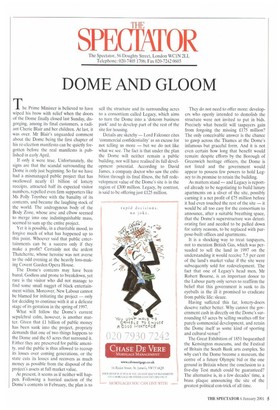DOME AND GLOOM
The Prime Minister is believed to have wiped his brow with relief when the doors of the Dome finally closed last Sunday, disgorging. among its final customers, a radiant Cherie Blair and her children. At last, it was over. Mr Blair's unguarded comment about the Dome being the first chapter of his re-election manifesto can be quietly forgotten before the real manifesto is published in early April.
If only it were true. Unfortunately, the signs are that the scandal surrounding the Dome is only just beginning. So far we have had a mismanaged public project that has swallowed nearly £1 billion of lottery receipts, attracted half its expected visitor numbers, repelled even firm supporters like Ms Polly Toynbee with the banality of its contents, and became the laughing stock of the world. The androgynous body of the Body Zone, whose arse and elbow seemed to merge into one indistinguishable mass, seemed to sum up the entire project.
Yet it is possible, in a charitable mood, to forgive much of what has happened up to this point. Whoever said that public entertainments can be a success only if they make a profit? Certainly not the ardent Thatcherite, whose heroine was not averse to the odd evening at the heavily loss-making Covent Garden Opera House.
The Dome's contents may have been banal. Godless and prone to breakdown, yet rare is the visitor who did not manage to find some small nugget of black entertainment within. Moreover, New Labour cannot be blamed for initiating the project — only for deciding to continue with it at a delicate stage of its gestation in the spring of 1997.
What will follow the Dome's current sepulchral calm, however, is another matter. Given that £1 billion of public money has been sunk into the project, propriety demands that one of two things happens to the Dome and the 63 acres that surround it. Either they are preserved for public amenity, and the public is thus allowed to recoup its losses over coming generations, or the state cuts its losses and recovers as much money as possible from the disposal of the project's assets at full market value.
At present, it seems as if neither will happen. Following a hurried auction of the Dome's contents in February, the plan is to sell the structure and its surrounding acres to a consortium called Legacy, which aims to turn the Dome into a 'dotcom business park' and to develop part of the rest of the site for housing.
Details are sketchy — Lord Falconer cites 'commercial confidentiality' as an excuse for not telling us more — but we do not like what we see. The fact is that under the plan the Dome will neither remain a public building, nor will have realised its full development potential. According to David James, a company doctor who saw the exhibition through its final illness, the full redevelopment value of the Dome's site is in the region of £300 million. Legacy, by contrast, is said to be offering just £125 million. They do not need to offer more: developers who openly intended to demolish the structure were not invited to put in bids. Precisely what benefit will taxpayers gain from forgoing the missing £175 million? The only conceivable answer is the chance to gawp across the Thames at the Dome's infamous but graceful form. And it is not even certain how long that benefit would remain: despite efforts by the Borough of Greenwich heritage officers, the Dome is not listed and the government would appear to possess few powers to hold Legacy to its promise to retain the building.
As matters stand — and Legacy is reported already to be negotiating to build luxury apartments on a sliver of the site, possibly earning it a net profit of £75 million before it had even touched the rest of the site — it would be all too easy for the consortium to announce, after a suitable breathing space, that the Dome's superstructure was deteriorating fast and needed to be pulled down for safety reasons, to be replaced with purpose-built offices and apartments.
It is a shocking way to treat taxpayers, not to mention British Gas, which was persuaded to sell the land in 1997 on the understanding it would receive 7.5 per cent of the land's market value if the site were subsequently sold for redevelopment. The fact that one of Legacy's head men, Mr Robert Bourne, is an important donor to the Labour party only serves to reaffirm the belief that this government is sunk to its eyeballs in the ill it promised to eradicate from public life: sleaze.
Having suffered this far, lottery-doers deserve rather better. Why cannot the government cash in directly on the Dome's surrounding 63 acres by selling swathes off for purely commercial development, and retain the Dome itself as some kind of sporting and cultural venue?
The Great Exhibition of 1851 bequeathed the Kensington museums, and the Festival of Britain the South Bank arts complex. So why can't the Dome become a museum, the centre of a future Olympic bid or the one ground in Britain where the conclusion to a five-day Test match could be guaranteed? The alternative is, in a few decades' time, a brass plaque announcing the site of the greatest political con-trick of all time.


















































 Previous page
Previous page